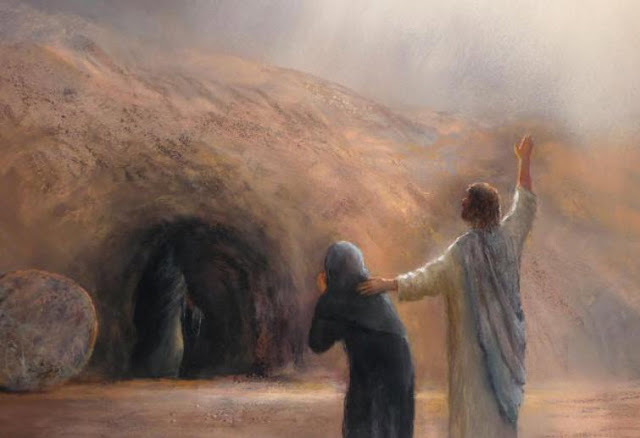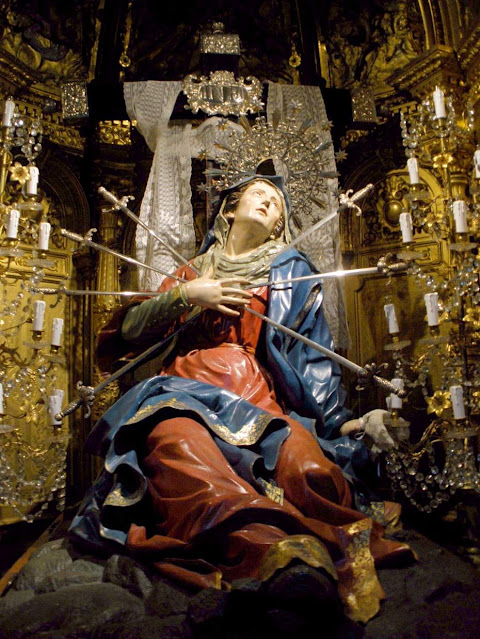As they approached Jerusalem and came to Bethphage on the Mount of Olives, Jesus sent two disciples, saying to them, “Go to the village ahead of you, and at once you will find a donkey tied there, with her colt by her. Untie them and bring them to me. If anyone says anything to you, say that the Lord needs them, and he will send them right away.”
This took place to fulfill what was spoken through the prophet:
“Say to Daughter Zion,
‘See, your king comes to you,
gentle and riding on a donkey,
and on a colt, the foal of a donkey.’”
The disciples went and did as Jesus had instructed them. They brought the donkey and the colt and placed their cloaks on them for Jesus to sit on. A very large crowd spread their cloaks on the road, while others cut branches from the trees and spread them on the road. The crowds that went ahead of him and those that followed shouted,
“Hosanna to the Son of David!”
“Blessed is he who comes in the name of the Lord!”
“Hosanna in the highest heaven!”
When Jesus entered Jerusalem, the whole city was stirred and asked, “Who is this?”
The crowds answered, “This is Jesus, the prophet from Nazareth in Galilee.”
Matthew 21:1-11
And some of the Pharisees in the crowd said to him, “Teacher, rebuke your disciples.” He answered, “I tell you, if these were silent, the very stones would cry out.”
And when he drew near and saw the city, he wept over it, saying, “Would that you, even you, had known on this day the things that make for peace! But now they are hidden from your eyes. For the days will come upon you, when your enemies will set up a barricade around you and surround you and hem you in on every side and tear you down to the ground, you and your children within you. And they will not leave one stone upon another in you, because you did not know the time of your visitation.”
Luke 19:39-44
And he entered Jerusalem and went into the temple. And when he had looked around at everything, as it was already late, he went out to Bethany with the twelve.Mark 11:11
His disciples did not understand these things at first, but when Jesus was glorified, then they remembered that these things had been written about him and had been done to him. The crowd that had been with him when he called Lazarus out of the tomb and raised him from the dead continued to bear witness. The reason why the crowd went to meet him was that they heard he had done this sign. So the Pharisees said to one another, “You see that you are gaining nothing. Look, the world has gone after him.”
John 12:16-19
Today marks Palm Sunday, the day where we celebrate Jesus's triumphal entry into Jerusalem, marking the beginning of Holy Week. The Triumphal Entry is one of the primary accounts in Jesus's life that is recorded in all four synoptic Gospels. While each includes their own additional detail and color, the primary events remain consistent.
Jesus approaches Jerusalem and instructs his disciples to get a donkey's colt. If they are asked about it, they are supposed to say, "the master has need of it." Jesus then enters Jerusalem on the colt, met with a grand reception. The crowd lays out their garments and palms before him, proclaiming "Hosanna, Blessed is he who comes in the name of the Lord."
From the consistency of the account, we can gather the historicity of the event. All were recording an event they would have been eyewitnesses to. But the beauty of the accounts also lies in the symbolism they contain.
First, we see the fulfillment of prophecy. The disciples are able to locate a colt just as Jesus describes, so that his ride can fulfill the prophecy of Zechariah. "Shout in triumph, O people of Jerusalem! Look, your King is coming to you. He is righteous and victorious, yet he is humble, riding on a donkey - riding on a donkey's colt." Zechariah 9:9 (NLT). Matthew makes explicit reference to this prophecy in his account.
Second, the donkey itself holds tremendous symbolism. In Eastern tradition, the donkey was a symbol of peace, unlike the horse which was a symbol of war. If a king came riding in on a horse, he was coming for war. When he rode in on a donkey, he was bringing peace. The entry on a donkey symbolized Christ's coming as the Prince of Peace.
Next, the laying of garments recognized the kingship of Jesus. In the ancient Near East, it was customary to cover the ground in front of royalty, those worthy of the highest honor. By throwing their garments down in front of Jesus in his entry the people were recognizing Jesus as someone worthy of honor. The King of Kings.
{As a side note, royalty in those days was also known by their scent. They would have worn the finest perfumes and been one of the few that would smell as such. Scent alone meant instant recognition of royalty. If Jesus was anointed before his entry, as John's gospel records, then the crowd would also have had the recognition of the smell of nard, denoting his status as royalty.}
The Palm Branch, in Greco-Roman tradition, was a symbol of victory, associated with the goddess Nike or Victoria. It meant triumph. And its use would have marked to the Romans in the crowd the victory of Jesus. In Jewish tradition, it was likewise associated with liberation, the celebration noted in 1 Maccabees 13:51. "And entered into it … with thanksgiving, and branches of palm trees, and with harps, and cymbals, and with viols, and hymns, and songs."
Finally, the shouts of Hosanna, pointed to Jesus as savior, translating as a desperate cry of "Save us!" Found in only one place in the Old Testament, in the Psalms, "Save us, we pray, O Lord! O Lord, we pray, give us success!" The cry of Hosanna is immediately followed with "Blessed is he who comes in the name of the Lord," again from the Psalms. So the crowd is crying for Jesus to save them, as the one who comes from the Lord. The promised Messiah was here.
Kings of Kings,
Lord of Lords,
Prince of Peace,
Messiah.
Immanuel - God with us.
Almighty and everlasting God, who, of thy tender love toward mankind hast sent thy Son our Savior Jesus Christ to take upon him our flesh, and to suffer death upon the cross, that all mankind should follow the example of his great humility: Mercifully grant that we may both follow the example of his patience and also be made partakers of his resurrection; through the same Jesus Christ our Lord. Amen.







%5B4%5D___Gallery.jpg)


